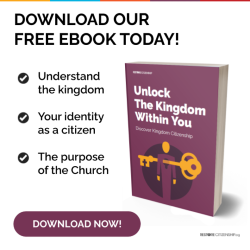As the cycle of election looms, Christians find themselves in a quandary about who to support and which party to vote for.
The question of voting comes with a mirage of difficult overlapping issues. We would all agree that how we approach these questions will significantly affect the outcome of the nation we are a part of. For the Christian we have two countries to consider. First our heavenly, second earthly. Both realms consist of the same basic principles i.e. authority, law, government, citizenship and culture. These concepts are integral to understanding our identity as citizens and the conflict which takes place between the two realms. However from this point forward that is about as far as the similarities go.
So what does the bible have to say?
AUTHORITIES
Who should I vote for? It is not a question of who you vote for, but a question of who your allegiance is with.
The debate between God's sovereignty and man's delegated authority has burned many a midnight oil. This has often been made even more complex by the disobedience of men. Nevertheless the scriptures urge us to honour authorities because it is a powerful way of demonstrating to tyrants the sovereignty of God. As we rightly submit to Gods authority we can powerfully by our submission correct that which has become misappropriated.
Notable patriarchs such as Daniel, Esther, Mordecai and Nehemiah to name but a few demonstrate the nobility of such stands in the face of real and present danger. Despite facing death their civil disobedience wrought by obedience to God brought about a greater reverence to the Lord most High and justice throughout the realms of men. But what motivated these great citizens?
New Testament Christians are admonished to do what our forefathers did by embracing the consciousness of sovereignty rooted in biblical history and the table of nations. This period of history launched the resettling of the nations by the hand of the Lord. In fact this period in time is one of the few incidences where we see the Lord directly addressing men without a go between.
Read Genesis 10:5, Deuteronomy 32:7-8, Acts 14:16-17, 17:26 The Lord dispersed the nations and set their boundaries until the appointment of the King and consummation of the Kingdom of God.
Read Psalms 2, Colossians 1:15. Numbers 23:21. The scriptures admonish us to go further beyond the revelations of the forefathers. We now have the appointed Son to whom and through whom we can address the authorities declaring the ever present King of kings.
Read Matthew 25:32, 1 Peter 3:22, Hebrews 2:8-9, Revelation 12:5, with the appointment of the Son of God as eternal King the matter of allegiance is settled. Our loyalties are to Him and Him alone. Thus as He is the cornerstone, every authority, law and government must be measured against His personality and characteristics. In other words the Lords citizens should judge delegated authorities in relationship to Christ before making a determination. Authorities and governments are not permitted to compete with the place of allegiance to the sovereign Lord.
The following account sums up the apostle’s allegiance:
Acts 4:18-20 'And they called them, and commanded them not to speak at all nor teach in the name of Jesus. But Peter and John answered and said unto them, Whether it be right in the sight of God to hearken unto you more than unto God, judge ye. For we cannot but speak the things which we have seen and heard'
LAW
Which party has the best policies? It is not a question of best policies, but does it line up with Gods commandments.
Unfortunately the law of God has become a neglected part of study for the Christian. This has been the case due to the absence of teaching regarding the application of the law through the new covenant. Hence our ignorance of this can be measured by our unwillingness as citizens to get actively involved within the mainstream political agenda. Let me state I do not mean getting into politics, i.e. political parties etc. A kingdom community should possess its own political decision making process which responds and articulates its theocratic position on issues which arise from the state and public affairs.
GOVERNMENT
How can I believe they will fulfill their campaign promises? It is not a question of promises but a matter of integrity.
Knowing the nature of government and its purpose plays a crucial role in understanding our responsibilities as citizens. Many Christians are unaware that their government consists of a theocracy, in fact our Kingdom communities lack a clear and consistent model of theocratic governance. Hence we often hold to secular ideas which are at odds with this because we only know what we have grown up with, which for the most part is a democracy.
The root meaning of the word government means to manage. The term lends itself well to the concept of stewardship. On the 4 June the Queen's Speech was delivered by Queen Elizabeth from the Throne in the House of Lords. Unknown to many the state opening of parliament has been orchestrated since 1852. The principles which underpin the pomp and ceremony convey the hidden truths of the relationship between a sovereign monarch and their government.
The government belongs to the sovereign and hence its jurisdiction is to manage the affairs of state. The government’s responsibilities are with the present and not the future. Today’s parties, politicians and policies make promises about a future they can rarely achieve. These promises are made with the hope of holding on to another five years in office.
Hence integrity, trust and faithfulness sum up the qualities which underpin good governance. In the light of recent ministerial scandals the lack of these qualities seems to have had a direct effect on the elections.
In relation to governance the scriptures again prove to be an ample source of wisdom on the subject. Romans 13 is a well-known text used time and time again regarding our relationship to government. It has been deemed by historians to be a treatise by Paul and the Apostles on the institution of model government.
The text highlights the following:
- Good government is ordained by God.
- Government officials are to be good ministers who represent God.
- Citizens must obey godly laws.
- Good government is not to be feared.
- We are to pay honour, custom and constitutional taxes to whom it is due.
- Government is to protect the righteous and punish the wicked.
As a result, we have a practical, historical and biblical mandate to fervently stand against any unconstitutional laws and all government officials who cease to acknowledge or fully manage public affairs in relation to the scriptures and our sovereign Lord.
CITIZENSHIP AND VOTING
Should I just vote the lesser of the two evils? If I don't vote does that make me a bad citizen? It is not a question of voting but a question of conscience.
Brewster’s millions was a comedy film that was a hit in the 80’s. The story was about a minor-league baseball player who needed to spend $30,000,000 in thirty days in order to inherit $300,000,000. The catch; he is not allowed to tell anyone about the deal. Hence those around him pulled their hair out thinking he was frivolously wasting his money.
One significant part of the movie is where Brewster thinks up a political plan. He creates a political party called 'none of the above' thinking he would be sure to waste sufficient funds and secure the inheritance. However contrary to the plan people actually vote for his party and more money flows in from donors to support his campaign.
The option on the ballet card to not vote for the above party resonated more with people’s convictions than the empty promises of the status quo.
Although a work of fiction Brewster's millions taps into the idea that whether we agree with what is being said or not, we have more respect from people who speak from their convictions rather than clever arguments. Why? Simply because we know where they stand. This issue was poignantly raised during the European elections regarding the United Kingdom Independence Party (UKIP).
Unfortunately recent events in mainstream media reveal that the pressures on us today means we no longer have the freedom of speech. Unless by freedom of speech we mean only the freedom to agree with the majority to avoid being ridiculed.
2 Corinthians 3:3 states: 'Forasmuch as ye are manifestly declared to be the epistle of Christ ministered by us, written not with ink, but with the Spirit of the living God; not in tables of stone, but in fleshy tables of the heart'
2 Corinthians 10:5 states: “Casting down imaginations, and every high thing that exalteth itself against the knowledge of God, and bringing into captivity every thought to the obedience of Christ;
In a practical sense when we read the scriptures above how is this expressed amongst Kingdom citizens? Is this manifest personally or corporately, or both?
Being a living epistle requires citizens of the Kingdom of God to play an active role supporting the development of a theocratic model of government in so doing resisting clever arguments which clearly contravene the law of God. In truth there are not many communities with this one goal in mind, rather various shades of the same type, administering round the clock services. We need communities to meet for more than the status quo.
Cultivating the consciousness of Kingdom citizenship fuels the liberty within theocracy and fosters the zeal to build theocratic governance. Abstaining from voting for one government doesn't mean we are without government. However failure to apply ourselves to theocratic governance will have us fall foul of this guilt and condemnation.
For King and for country...





